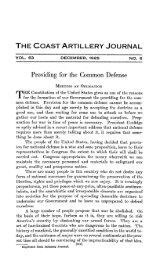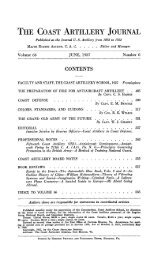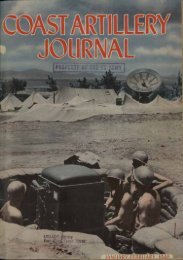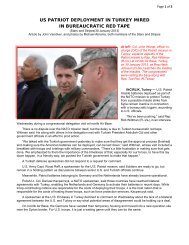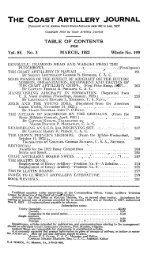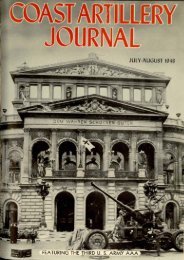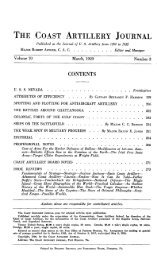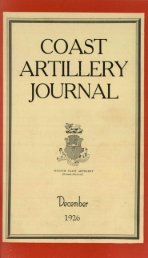COAST. I ARTILLERY JOURNAL, - Air Defense Artillery
COAST. I ARTILLERY JOURNAL, - Air Defense Artillery
COAST. I ARTILLERY JOURNAL, - Air Defense Artillery
You also want an ePaper? Increase the reach of your titles
YUMPU automatically turns print PDFs into web optimized ePapers that Google loves.
484 THE <strong>COAST</strong> <strong>ARTILLERY</strong> <strong>JOURNAL</strong><br />
General Girot, the chairman of the military commission in the chamber of<br />
deputies gives expression to some of these difficulties when he says that it has<br />
been impossible for him to bring the most important proposed military laws up<br />
for fair discussion and disposition when there came up a new war minister in<br />
every fortnight; that to reach a conclusion regarding laws for the government of<br />
the army and contentment to the officers and noncommissioned officers demands<br />
repose and stability; that the army, which was apparently a very simple organization<br />
was, in reality, made up of thousands of details not one of which could be<br />
neglected or overlooked. How could progress be expected when there came into<br />
office every month a new minister with his own plans who knew nothing of the<br />
projects of his predecessor? Girot says he has received the project of General<br />
Nolet and then the first project of Painleve, then the project of Daladier, again<br />
the second project of Painleve. All of them contain something that is good, but<br />
where there came tomorrow the project "X" and on the day after tomorrow the<br />
project "Y" and so on, it was impossible to know what to do with all the<br />
stuff. Should the army commission go ahead on its own hook without consulting<br />
the general staff or the war minister for the time being? But the army is entitled<br />
to have its condition clearly set forth and its demands seriously considered.<br />
Continual change of ministry, the writer contends, is not a manifestation of<br />
modern conditions but a development of the parliamentary system. There were<br />
forty-one changes of ministry from the time when Gambetta was relieved in 1871<br />
up to 1913. There were frequently three or four changes in a single year.<br />
General Girot's predecessor as chairman of the army commission, Lieut.<br />
Colonel Fabry, mentions a number of the special worries that are oppressing the<br />
French Army. First comes the energetic assertion that the army is going to perdition<br />
because the statement that France's security was founded on its armed<br />
forces was not sufficient, since one must not forget that those forces must also<br />
have arms. That the army needs above all and at once a law regulating cadres<br />
and their effective strength, if the use of an instrument available to unscrupulous<br />
hands for disaffection and violence is to be avoided.<br />
Officers in the United States Army who are on active duty with skeleton<br />
organizations and units of troops will readily sympathize with Colonel Fabry in<br />
his survey of existing conditions of the French Army when he brings out facts<br />
due in part to attempts to keep up an establishment of thirty-two active divisions<br />
notwithstanding the demands made upon the home forces for colonial service<br />
(Morocco, Syria) and occupational troops in Germany. In every French regiment,<br />
he says, "the bare bones protrude through the skin" rendering proficient training<br />
impossible. Infantry regiments of ostensibly 1776 men have 564; artillery<br />
regiments of 705 men have 246; a cavalry regiment of 764 men has actually 205;<br />
and in the tank regiment of 750 men there are 254." Additional mournful dirges<br />
are heard not only from thll utterances of Colonel Fabry but from many other<br />
sources, in regard to the disagreeable living conditions of officers and noncommissioned<br />
officers and their families, where compensations are inadequate to<br />
provide for decent quarters and subsistence. The families of many married noncommissioned<br />
officers are quartered in barracks with only a thin door partition<br />
between them and the men's barrack rooms.<br />
Excerpts from the French press, taken at large, indicate much interest in<br />
proposed measures for reorganization of the French Army throughout the country.<br />
It is, however, remarkable that nothing is being said by the press, as far as is<br />
known, about reduction of armaments in connection with any proposed changes<br />
of organizations.



